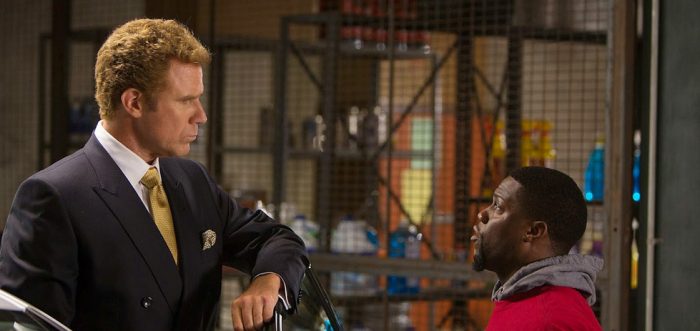
Will Ferrell and Adam McKay, the producer team behind Get Hard, made studio films a lot harder for themselves when they founded Funny or Die back in 2007. Having made a space where even the most fanciful ideas and low-end production values could be aired, they needed very good reasons to return to the overheads of Hollywood feature production. Why this time especially, when having Ferrell’s prejudiced one-percenter pay an innocent black carwash owner (Kevin Hart) for prison training reads like such a one-shot? Maybe they thought the project had an incendiary quality to it, and could leave a black eye on racist attitudes in the same gut-busting fashion as Trading Places and Silver Streak before. There are traces of that in the wider film, like when Ferrell’s character rattles off incarceration statistics to explain his way of thinking, and looks for a confounding moment like he had a point to make all along. Yet, rather than pull that provocative thread out, director Etan Cohen allows the affair to settle back into gay-panic gags and comedic set pieces that we would have digested in 10 minutes just as aptly as the movie’s protracted 100.
Head-turning comedy films have some sense for cinematic language to go with their premises, but Cohen finds no such style in his directing debut. After years of writing for film & TV (King of the Hill, Tropic Thunder), he saves the flair for slow-mo gags of Ferrell toking and ghost-riding, plus one strange and irritating strobe-light sequence. Everything else is done on auto-pilot, with every location, indoors and out, being lit in exactly the same way, and shot in the default mid-shots of multi-cam comedy. The only aspect with some level of craft is Christophe Beck’s score, which makes beats out of stock jail sound effects; stictly a novelty, sure, but at least better than the dullness of other marquee-filling goofs like Horrible Bosses. After the likes of Lord & Teller, who have shown that even a crass premise can benefit from a parodic aesthetic, this feels flat-out dusty.
Thematically, though, some aspects of the film are promising enough to be tolerable. The casting, for one. Ferrell has a good mind to play his stats-crunching suit for the chump that he is, even while the script has other ideas, and Hart extends his brand of shunning the thug-life stereotype by spooking his protege with its tics. Allison Brie, Craig T. Nelson, Ron Funches and T.I. comprise some decent supporting choices, even though they deserve a better story to work with; Brie especially, in a thankless cuckold role that echoes an objectifying view of women throughout. Yet, the movie is more concerned with softening its gay-panic shades, by giving Hart a sweet interlude with a gay man called Chris (T.J. Jagodowski), and concurrently cleaving to the “balls equality” rule via a crass sequence in a toilet cubicle. The most I can say for those mixed results is that it isn’t unwatchable, and even amusing at times.
These are all faint glimmers, though, overshadowed by the film’s real stumble: its race relations, which are about as nuanced as a coffee chain’s HR department. It has an interesting starting position, with both James (Ferrell) and Darnell (Hart) being curiously disconnected from major parts of their lives and cultures. James is obviously a stooge in the corporate world, but Darnell has an over-protectiveness that makes him fear his own neighbourhood and cuts him off from the gangster culture of his own cousin (played with impressive confidence by T.I.). Having their insecurities mingle could have made for a surprising narrative, but sadly, it comes to wildly over-favour James’ side of the equation. It certainly looks to mock him at first, with his naked squats and sexual timidity, but eventually slumps on lazy heart-of-gold moralising, completely over-rewarding his behaviour in an effort to pad out the feature runtime. He benefits from viewing and wearing black culture like a stolen suit of armour, while his new ghetto friends get hand-me-down financial advice and handouts for their hard work in amending his gaping flaws as a human being. It even goes so far as to give him the end narration, as though we are to be placed in his shoes, despite the fact that he is neither a sympathetic hero nor a morbidly interesting anti-hero. Darnell, meanwhile, gets the chance to threaten white supremacists with trash talk and a flamethrower, but it’s as shallow a pleasure as the gang-rape gags he has to deliver, and his happy ending only reinforces the racial that the scene is looking to invert.
The limpness of the whole affair really stings for the same reasons it could have been great. In an age where the conversation on multi-racial roles and stories is being followed through on (much to the chagrin of certain Hollywood trades), Get Hard had, at least in theory, a good chance of being insightful. The tie-ins with homosexual stereotypes and the yawning class schism of America could have lent it some satirical heft, but it’s ultimately too conservative to break out of that conditional tense.
